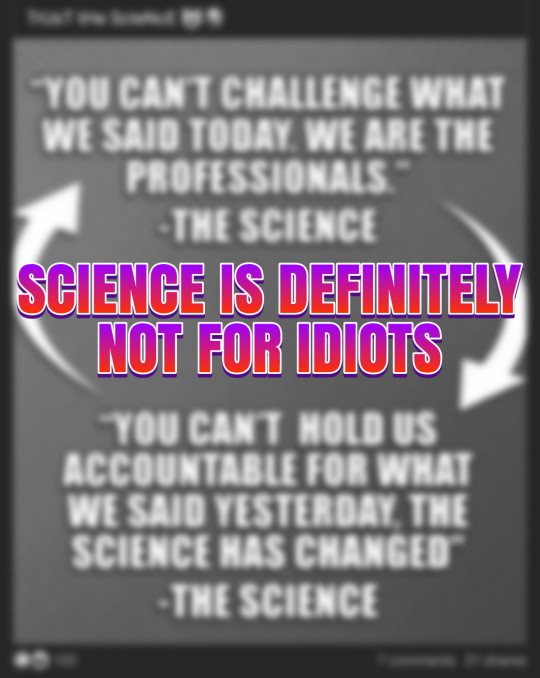#Empirical Evidence
Explore tagged Tumblr posts
Text
Science Is Definitely Not For Idiots
Let’s indulge in a merciless, blistering critique of the shallow, willful ignorance permeating this brand of anti-science rhetoric, dissecting its roots in conspiratorial bias, intellectual laziness, and performative outrage.

Oh, the Tragedy of Basic Understanding
It’s truly impressive—and by “impressive,” I mean depressingly consistent—that the people peddling this kind of hollow, thoughtless rhetoric misunderstand the scientific process at a molecular level. The meme captures, with unwitting precision, their simultaneous failure to grasp grade-school concepts and their smug certainty in misrepresenting those concepts to reinforce their biases.
Let’s start with a fundamental truth that should not be revolutionary to anyone past the age of seven: science is not a religion. It’s not a dogma. It’s not an oracle that dispenses unchanging, eternal truths upon demand. Science is a method. It’s a process of forming hypotheses, testing those hypotheses, collecting data, and refining or discarding ideas based on evidence. Science changes precisely because it is tethered to reality, evidence, and the willingness to abandon ideas when they are proven wrong. This adaptability is a feature, not a flaw.
Why, Then, Is This So Hard to Grasp?
The simple answer is: it’s not. The complex answer is that it serves a rhetorical purpose for those who don’t actually care about science but instead weaponize their misunderstanding as a cultural wedge. This strain of ignorance feeds on QMAGA conspiratorial thinking, which thrives on two key beliefs: (1) everything is a hidden plot against “common folks” and (2) expertise and knowledge are inherently suspicious, because they threaten their worldview of comfortable certainties.
So when science changes because new evidence emerges, these people don’t see that as progress. They see it as “proof” that science is unreliable, elitist, or even malicious. They are not interested in improving their understanding. Why bother, when the real purpose is to bludgeon reality into submission and reinforce their fragile sense of self-righteous superiority?
Irony, Ignorance, and the Ouroboros of Confidence
The layers of irony here are too thick to chisel through without breaking a sweat. These are the same people who, when faced with the implications of scientific evidence—be it climate change, vaccine efficacy, or public health measures—scream, “TRUST THE SCIENCE, RIGHT?” while flailing their arms and huffing with indignation. They misinterpret “trust the science” to mean “accept the current consensus as immutable dogma.” But no. That’s not what it means. It never was.
To any actual adult human being who graduated elementary school, “trust the science” means trusting the process: the peer review, the repeatability of experiments, the transparent presentation of data. Science builds, self-corrects, and grows stronger through this critical, open process. But these crusaders aren’t interested in that. They want science to be a one-time proclamation that aligns with their worldview, or they’ll smear it as fraudulent.
It’s almost poetic how they present themselves as warriors against the shifting sands of scientific evidence when, in reality, they are terrified of change itself. Any new data or conclusion that doesn’t confirm their beliefs is an attack on them personally. It’s a conspiracy. It’s the “elites.” It’s “big pharma” or “big science” or whatever imaginary cabal they’ve conjured this week to feel less impotent.
The Perpetual Victim Complex of Anti-Intellectualism
It must be exhausting to maintain this level of willful ignorance, where reality is a personal affront and facts are pliable things that exist only to inconvenience you. This meme is a snapshot of that perpetual victimhood—the idea that they are somehow being “held accountable” for their past words or actions by a “shifting” science.
Let’s talk about accountability. Accountability isn’t persecution; it’s part of intellectual growth. When the evidence changes, your conclusions must change. Otherwise, you’re not practicing critical thinking; you’re entrenching yourself in dogma. And what’s worse, you’re pretending that this obstinance makes you brave or wise. It doesn’t. It makes you fragile and unfit for complex discussions about society, health, technology, or the future.
A Reality Check (Not That You’ll Accept It)
If you honestly want to challenge science, you can. But here’s the catch: you have to play by the rules of the scientific method. You have to know how to read data, perform tests, and understand statistics. You have to submit your findings for peer review. You have to accept criticism and the possibility that you’re wrong. This isn’t a fucking Facebook argument you can win by memes or shouting louder. This is real life.
And the beauty of science? When you bring legitimate evidence, it changes. Yes, that is how reality works. This is what separates it from your shallow, performative, armchair “gotchas” on social media. “But muh science changed!” you scream. Yes, it changed because it is supposed to. It’s time you grew up enough to realize that clinging to static “truths” is for dogmatists, not for rational adults.
In Conclusion: Unmasking Your Bad Faith
When you smugly meme about “The Science,” you’re not making a brave stand for truth or holding anyone accountable. You’re outing yourself as a coward who cannot handle complexity or self-reflection. You are not challenging a system; you are merely whining that the system expects you to grow and learn. And that, in the end, is the core of this conspiracy-fueled charade. Not the pursuit of truth. Not accountability. Just pure, undiluted fear of a world that will not stay comfortably within the lines you’ve drawn.
Try harder next time. Science demands it. Reality demands it. And frankly, we all deserve better than this clownish drivel.
#science#scientific method#data#research#dunning kruger#intelligence#QMAGA#cult#conspiracy#conspiracy theory#theory#hypothesis#hypotheses#opinions are not facts#reason#logic#school#resist#anti intellectualism#empirical#empiricism#empirical evidence#evidence#epistemology#rfk jr#trump#joe rogan#god#religion#christian faith
4 notes
·
View notes
Text
Strengths and Weaknesses of Different Sources of Knowledge
In the pursuit of knowledge, humans rely on various sources to acquire and validate information. Each source has its own strengths and weaknesses, influencing its reliability, accuracy, and applicability. Here is an analysis of some primary sources of knowledge:
1. Empirical Evidence
Empirical evidence is knowledge gained through sensory experience and observation.
Strengths:
Objectivity: Empirical evidence is based on observable and measurable phenomena, providing objective and verifiable data.
Reproducibility: Experiments and observations can be repeated to confirm findings, enhancing reliability.
Practical Application: It is directly applicable to the real world, making it useful for scientific and practical purposes.
Weaknesses:
Limitations of Observation: Human senses and instruments have limitations and can sometimes misinterpret data.
Context Dependency: Observations can be context-specific and may not generalize to different situations or environments.
Bias and Error: Even empirical data can be influenced by researcher biases and methodological errors.
2. Rationalism
Rationalism is the acquisition of knowledge through reason and logical inference.
Strengths:
Universality: Logical principles are universal and not subject to variations in context or culture.
Internal Consistency: Rationalist methods ensure internal consistency and coherence in theoretical frameworks.
Clarity and Precision: Logical analysis provides clear and precise arguments, reducing ambiguity.
Weaknesses:
Abstract Nature: Pure reason can sometimes be detached from empirical reality, making it less applicable to practical situations.
Assumptions: Rationalist arguments often rely on initial assumptions or axioms that must be accepted without empirical proof.
Complexity: Logical reasoning can be complex and difficult to follow, limiting its accessibility.
3. Authority
Knowledge from authority is derived from experts, institutions, or texts that are widely recognized as credible.
Strengths:
Efficiency: Relying on experts saves time and effort in acquiring specialized knowledge.
Expertise: Authorities often have deep knowledge and experience in their fields, enhancing the quality of information.
Trustworthiness: Established authorities typically undergo rigorous scrutiny and validation.
Weaknesses:
Dependence: Overreliance on authority can lead to a lack of critical thinking and independent analysis.
Potential for Bias: Authorities can have their own biases, agendas, or errors.
Outdated Information: Authoritative knowledge can become outdated as new discoveries are made.
4. Intuition
Intuitive knowledge is based on immediate understanding or gut feelings without conscious reasoning.
Strengths:
Speed: Intuition allows for rapid decision-making and problem-solving.
Holistic Understanding: It integrates diverse pieces of information into a coherent whole.
Creativity: Intuition can inspire innovative and creative ideas.
Weaknesses:
Subjectivity: Intuition is highly subjective and can vary greatly between individuals.
Lack of Verification: It is difficult to verify intuitive knowledge through external means.
Unreliability: Intuitive judgments can be influenced by emotions, biases, and cognitive heuristics, leading to errors.
5. Revelation
Revelation is knowledge gained through spiritual or mystical experiences, often considered divine or transcendent.
Strengths:
Profound Insight: Revelatory knowledge can provide deep, meaningful insights and a sense of purpose.
Personal Transformation: It can lead to significant personal and spiritual growth.
Cultural and Ethical Guidance: Revelation often forms the basis of religious and ethical systems.
Weaknesses:
Subjectivity: Revelatory experiences are highly personal and cannot be universally verified.
Interpretation: Different individuals and cultures may interpret revelations in varied ways, leading to conflicting beliefs.
Skepticism: It is often met with skepticism by those who rely on empirical or rational methods.
Understanding the strengths and weaknesses of different sources of knowledge is crucial for developing a well-rounded perspective and making informed decisions. Each source has its unique contributions and limitations, and often, a combination of multiple sources provides the most comprehensive understanding. Critical thinking and an awareness of these strengths and weaknesses can help navigate the complexities of acquiring and validating knowledge.
#philosophy#epistemology#knowledge#learning#education#chatgpt#metaphysics#ontology#psychology#Knowledge Sources#Empirical Evidence#Rationalism#Authority#Intuition#Revelation#Critical Thinking#Philosophical Analysis#Information Validation#reason#logic
2 notes
·
View notes
Text
The Mysterious Connection
Shared Spiritual Awakenings Across the GlobeIn the realm of spirituality and consciousness, a fascinating phenomenon often goes unnoticed: the simultaneous spiritual awakening experienced by individuals or collectives who have no prior connection. This concept transcends geographical boundaries, cultural differences, and social constructs, suggesting a profound and mystifying link within the…

View On WordPress
#Carl Jung#Collective Consciousness#Empirical Evidence#Human Spirituality#Interconnectedness#materialism#mysticism#spiritual awakening#synchronicity#Transcendence
4 notes
·
View notes
Text
I just noticed...
Been playing some Destiny 2 earlier. Leveling up a bunch of crafted weapons when I noticed something funny.
First get your "Doomed Petitioner" Linear Fusion Rifle and your "Empirical Evidence" Sidearm.
Now put on Slayer's Raining Blood and when Dave Lambordo starts drumming fire the Petitioner keep going till the song speeds up and when Dave goes a little more frantic switch to the Empirical.
You are welcome.
2 notes
·
View notes
Text
mfw it was 89°F here in south texas back in february


28K notes
·
View notes
Text
"Unlocking Destiny's Numbers: The Transformative Power of Numerology and Its Life-Enhancing Benefits"
“Deciphering Life’s Code: The Mystical Journey of Numerology and its Role in Shaping Personal Destiny” explores the time-honoured tradition of numerology, which probes into the profound influence of numbers on our life narratives and fates, especially those numbers associated with our birth year. This ancient method goes beyond mere number-crunching, suggesting that our destinies may be…

View On WordPress
#- Personal growth#- Self-discovery#Alphabetical-numeric correlation#Ancient practice#Anecdotal evidence#Astrology#Beginners guide#Birth chart#Birth year#Celestial bodies#Character#Cosmic blueprint#Destiny#Empirical evidence#Esoteric significance#Foresight#Fulfilment#Harmonious relationship#Kundali Rasi#Life path#Life trajectory#Life&039;s fortunes#Mystical dimension#Name modifications#Navamsa#Numerological predictions#numerology#Personal experiences#Personal growth#Personal transformation
0 notes
Text
Is work pleasureful for you?
Are you getting desirable returns on every decision you make?
Conversations with Sorinne - Preview - Episode #5 - Clip #6
Tune into the entire Conversation and more at www.ConversationsWithSorinne.com
#converstaions with sorinne#germinal g van#work is pleasure#return on investment#pragmatic#mathematics#unbiased#empirical evidence#motivation#inspiration#live your dreams#be logical#faith#due dilligence#evidence based
0 notes
Text

revenge solves everything.
by @lexsnotdead commissioned for swan song, in which daud is haunted by regrets and jessamine kaldwin.
#dishonored#jessamine kaldwin#love this so muuuuch lex's art is SO good such a treat!#also i love how true to character this feels despite jessamine representing something different ingame#really fucking good art.#wanted to give jess evidence of what she'd been through as well as opinions/feelings about it#like make the empress an active agent in the empire's fate#wanted to convey that with this piece and lex killed it!#(bad metaphor choices)#bust jess out of haunting the narrative. nahhhhh haunt the man who killed you babes cut out the middleman#for fun. well my fun. sorry daud#the wound remaining in stark red is also SUCH a great choice your brain is huge lex
101 notes
·
View notes
Text
while i absolutely do not think we, as trans ppl, are to blame for violence against us, it is becoming clearer + clearer that the idea that gender is something we are, some objective thing that may one day be scientifically validated, something we have to locate, is consistently going to be weaponized against us.
as frightening as it may be for many of us, we have to cut our strings tying us to this belief that anyone is provably or essentially a man/woman/nb. the project of scientifically defining gender will always become a project of controlling us (at best) + genocidal ambition (at worse).
we will never be able to empirically prove our own gender well enough to satisfy someone who has already decided we're the unspoken gender of "fucking freak". this is a dead end project, emphasis on the dead.
#what if we have the unconditional right to be exactly who we are + what we want to be#without needing empirical evidence that we can't help but be that way
701 notes
·
View notes
Text
The number of times I've seen people argue that Bruce is a decent father and that he is not abusive absolutely blows my absolute mind.
Yes, you can hc whatever version of Bruce you want. You can even blame it all on bad writers or reject canon. You can claim comic!Bruce isn't your Bruce and main a different version of him. Those are all valid.
However, you can NOT say that he has ever been justified for hitting his kids. There is no excuse for him willingly laying his hands on his kids. It doesn't matter if the person is drunk, drowning in grief, lost in emotions, whatever. Hitting kids is not okay.
Continually, the physical abuse is a very obvious sign of Bruce being a shit dad in the comics. On top of that, there is so much emotional abuse and manipulation as well. He's shitty as fuck to his kids and there's no reason this is okay. He may love those kids, but that doesn't excuse his behaviors.
Anyways, reject canon Bruce all you want. There's certain aspects of other characters I reject, and DC stands for Disregard Canon. Feel free to have whatever version of Bruce you desire.
What is NOT okay is excusing or accepting canon Bruce's actions/behaviors as acceptable.
#dc comics#dc universe#batman#bruce wayne#I've seen people argue that bruce can hit his kids because they are all vigilantes#what kind of stupid ass logic is that?#tw child abuse#tw abuse#i don't like getting into arguments with people but some of these excuses floor me#“they're both adults” no. that's not how child-parent relationships work#even after a kid becomes an adult the parent still has some level of power over the kid and the relationship is not equal#bruce is and has been the adult for their entire relationship. he's the parent#even if they weren't parent and child people should not be resorting to violence to solve arguments#people out here arguing Bruce isn't a shitty dad at all and still deny it when shown empirical evidence#good dad bruce is great (and shown in some media) but isn’t universal#blame the writers or say you don't accept that version of bruce but don't say he isn't canonically shit#yes bruce can still love his kids and be abusive. the two aren't mutually exclusive#bruce wayne bashing
99 notes
·
View notes
Text
Exploring the Foundations of Belief: Justifications and Perspectives
Beliefs, the mental attitudes or convictions that something is true or exists, can be justified through various means. People often rely on different justifications depending on the nature of the belief and the context. Here are some common justifications for beliefs:
Empirical Evidence:
Definition: Empirical evidence is information acquired through observation or experimentation. Example: Believing that the sun rises in the east and sets in the west is justified by the repeated empirical observation of this phenomenon.
Logical Reasoning:
Definition: Logical reasoning involves using valid deductive or inductive arguments to arrive at a conclusion. Example: Believing that all humans are mortal because a specific person is mortal (inductive reasoning based on observation).
Personal Experience:
Definition: Personal experiences contribute to the formation of beliefs based on individual encounters and observations. Example: Believing a particular food is delicious because of personal enjoyment during past consumption.
Testimony:
Definition: Testimony involves believing something because it has been communicated by a credible source. Example: Trusting a friend's recommendation for a good book or movie.
Intuition:
Definition: Intuition is the ability to understand or know something immediately without the need for conscious reasoning. Example: Having a gut feeling that a decision is right without being able to articulate specific reasons.
Authority:
Definition: Believing something because it comes from an authoritative figure or source. Example: Accepting scientific theories because they are endorsed by reputable scientists.
Cultural or Social Influence:
Definition: Beliefs can be shaped by the cultural or social environment in which an individual is embedded. Example: Adopting religious beliefs prevalent in one's cultural or familial context.
Pragmatism:
Definition: Pragmatism justifies beliefs based on their practical consequences or usefulness. Example: Believing in the value of education because it leads to better career opportunities.
Consistency with Existing Beliefs:
Definition: Individuals may justify new beliefs by ensuring they align with their existing belief system. Example: Accepting a new scientific discovery that is consistent with one's understanding of related scientific principles.
Existential or Emotional Need:
Definition: Some beliefs fulfill existential or emotional needs, providing comfort or purpose. Example: Believing in an afterlife may provide comfort in the face of mortality.
People often use a combination of these justifications to form and maintain their beliefs, and the weight given to each justification can vary based on individual preferences, cognitive styles, and cultural influences. It's essential to critically evaluate beliefs and the justifications supporting them to promote a more rational and informed worldview.
#philosophy#epistemology#knowledge#ontology#learning#chatgpt#education#metaphysics#psychology#politics#belief formation#empirical evidence#logical reasoning#personal experience#testimony#intuition#authority#cultural influence#pragmatism#existential needs#critical thinking
4 notes
·
View notes
Text

#🥀*#there is a correct answer btw#statistical analysis#evidence based#empirical research#my undergrad statistics professor would be so proud#stay tuned for my next poll: has klaus mikaelson ever had fleas?
31 notes
·
View notes
Text

This feels like Leicester, Faerghus, Church, and Adrestia GL, in that respective order. Explanations on the tags, if you want.
#being the most chill not-chill nation in Fodlan that also goes for the GL the Alliance likes especially bc of Marihilda existing#I had a hard time deciding what kind of GL the Kingdom would like bc they feel like they'd like BL more#though ofc toxic situationship is a Faerghan staple regardless of the genre of gay#The Church may cancel things like a Netflix GL series but Rhea is literally bi so why would she ban GL#I daresay she's even the most encouraging of corporate worker GL if Catherine and Shamir aren't enough evidence#Though the Empire is a fruit garden they most definitely banned GL under Duke Aegir's de-facto rule#fire emblem#fire emblem three houses#fe3h
21 notes
·
View notes
Text
hey hetalia fandom do we all agree that holy roman empire is actually germany or nah?
32 notes
·
View notes
Text
Every new piece of information I see coming out of Al-Shifa and the surrounding area is more devastating than the last.
Kidnappings, torture, point blank executions, new reports from those on the ground of the IOF raping and killing women, I have no words.
Western media will undoubtedly be silent about this most recent atrocity as they’ve been silent on, ignored, or sugarcoated everything else the last six months.
#when evidence of the IOFs cruelty and torturous nature comes to light I doubt the New York Times will cover it like they did#the debunked ‘Hamas mass rape’ story#it never had to come to this#every single media outlet politician zionist celebrity and influencer are complicit and culpable#free palestine#rape tw#I hope every IOF member dies actually#israel will perish#death to israel#death to imperialism#death to empire
76 notes
·
View notes
Text
So was anyone going to tell me Nasch's kingdom had a name, or was I just expected to learn about The United Lands Of The Poseidon Ocean by randomly browsing the wiki trying to put together a proposed timeline of the Barian emperors in order of death?
#It has a name??? This changes EVERYTHING#okay maybe I already had it penciled in as being a cross cultural empire somewhere in the mediterranean and possibly parts of the atlantic#but the name 'poseidon' adds SO MUCH MORE evidence to my 'Nasch's kingdom and Jaden's kingdom are anthropologically related' theory#do we think theyre still a nation#are they near New Atlantis#do they have a team at the olympics#these are all equally important questions#yugioh#yugioh zexal#shark kastle#ygo zexal#emperor nasch
28 notes
·
View notes